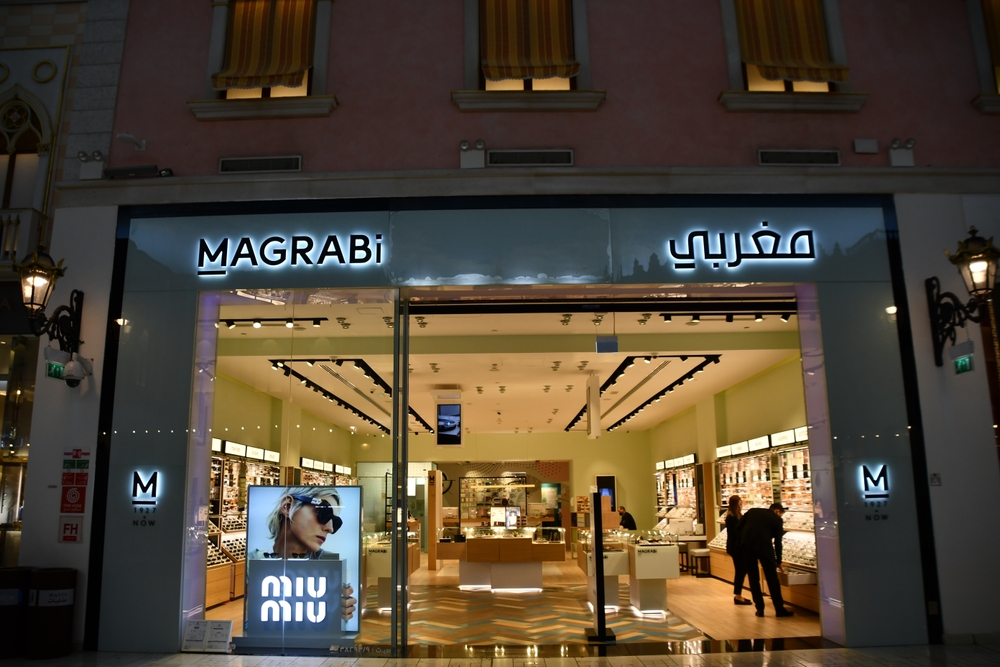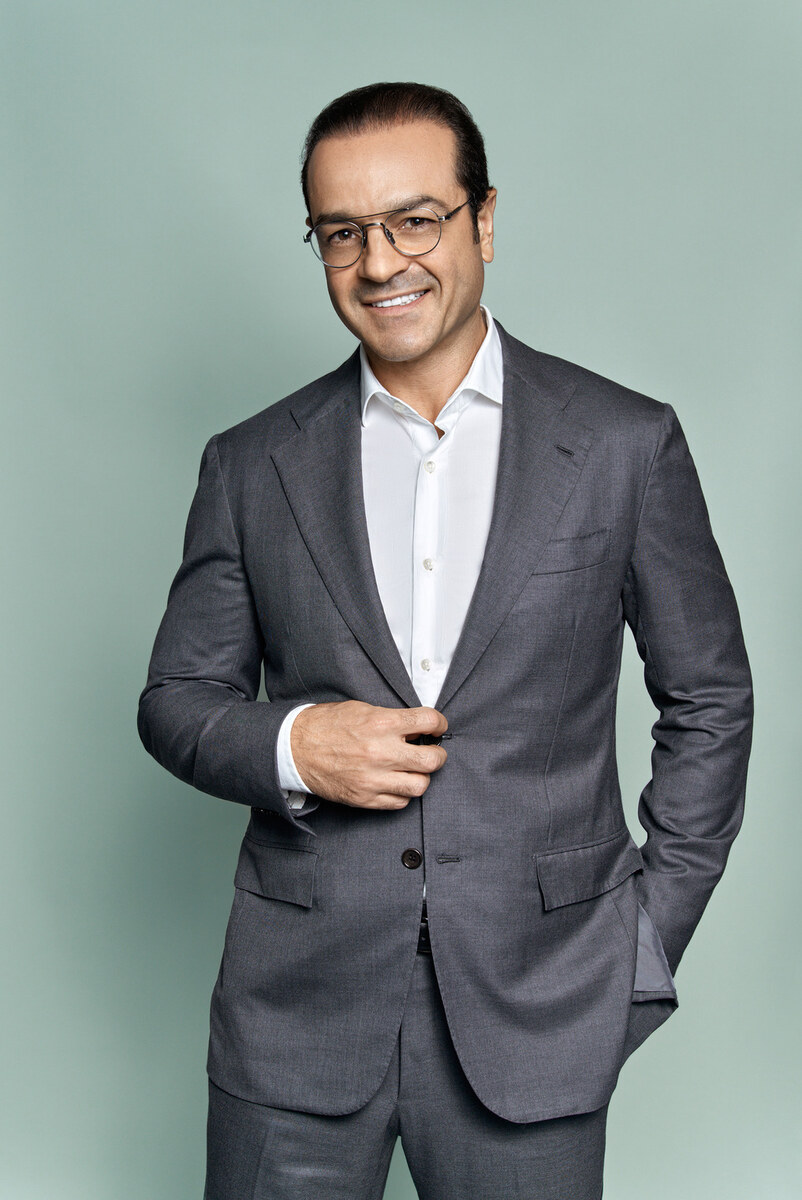RIYADH: The Middle East’s eyewear market is set to be reshaped by a merger between MAGRABi Retail Group and Rivoli Vision which will see a focus on innovation and customer experience.
According to Amin Magrabi, chairman of MAGRABi Retail Group, the deal will see store concepts integrated with digital platforms to offer a comprehensive range across luxury, premium, and mainstream segments.
MAGRABi will take over 89 Rivoli Vision stores across the UAE, Qatar, Oman, and Bahrain, expanding the firm’s footprint to seven countries and over 290 locations by the end of 2024.
A perfect fit for the future
Speaking to Arab News, Magrabi described the creation of the MAGRABi-Rivoli Enterprise as “a very exciting announcement for us.”
He added: “The industry is maturing, and as industries mature, scale becomes important. We have been in discussions for a while, looking for the perfect fit, and I truly believe that Rivoli Vision is a perfect fit for us in terms of the brand, the banner they bring, Rivoli EyeZone, the culture, the team, and the location.”
Magrabi highlighted that the synergy between the two companies is grounded in their shared vision for the future of the industry.
He underscored the significance of aligning in vision and culture, emphasizing that success hinges on a mutual understanding of the industry, a complementary approach, and a shared commitment to enhancing customer experience.
Ramesh Prabhakar, vice chairman and managing partner of Rivoli Group, said in a press release: “MAGRABi is the ideal partner to form this joint enterprise, positioning us as the top eyewear retailers in key geographies and economic centers of the Middle East.”
Magrabi also pointed out that both companies’ shareholders share a unified perspective on the future, making their collaboration with Rivoli Vision and MAGRABi Retail Group both effective and harmonious.

MAGRABi will have a presence in seven countries and over 290 locations by the end of 2024. Shutterstock
A future-ready investment strategy
The expansion is accompanied by a robust investment strategy aimed at enhancing the end-to-end customer experience.
“With the additional network and scale that comes with it, it obviously allows us to further invest and to increase our investments in enhancing the end-to-end customer experience, both offline and online,” Magrabi shared.
Yasser Taher, CEO of MAGRABi Retail Group, also shared his perspective on the merger’s financial and operational impact, emphasizing the anticipated growth and strategic advantages.
“The newly merged entity is expected to deliver double-digit revenue growth and high double-digit EBITDA (earnings before interest, taxes, depreciation, and amortization) growth, from identified synergies, during the period from 2025 – 2027,” Taher said.
He further elaborated on the operational strategies post-merger, saying: “We expect the integration timeline plan to be completed within a period of 15 months after closing. The synergy realization plan will overlap with the integration plan and should be completed over a period of 24 months.”
Completion of the transaction remains subject to satisfaction of commercial and regulatory conditions.
Taher also gave details about a “new headless online platform” which will see customers engage with the company on any platform at any time, from any place.
He went on: “They can click and collect from the store or get it delivered to their house. They can hold products in the store, book their eye tests, and do all this through the website or the app on their phone.”
MAGRABi Retail Group has already committed to substantial investments in digital transformation and store enhancements, with annual expenditures exceeding SR100 million ($26.6 million) over the past three years.
Magrabi expects these numbers to increase significantly in the coming years, reinforcing the company’s position as a leader in the region’s eyewear market.
“We will carry on making those investments, and they will obviously increase, not insignificantly above what we have been doing previously,” the chairman said.
He also discussed the strategic improvements expected in supply chain and inventory management due to the merger.
He said: “The scale of the new entity will enable higher investment into supply chain automation, including further investment in our manufacturing facilities, warehouse operations, our central glazing lab network, and last-mile delivery fulfillment.”
Magrabi added that the impact will be measured through a more efficient supply chain, faster lead time delivery customers, improved costs, and an optimized inventory value.

Amin Magrabi, chairman of MAGRABi Retail Group. Supplied
Strategic market leadership
The merger is also set to strengthen the Group’s strategic positioning across the Middle East.
Magrabi said: “Our three-year strategy plan from 2025 to 2027 is really to focus on how we can establish leadership across all seven countries we now operate in. We plan to carry on our leadership position in the region.”
The firm’s approach to market segmentation is clear.
“As this market matures, there will be segmentation in the market. From our perspective, we’ve segmented the market into four segments: luxury, premium, mainstream, and value. Our intention is to focus on luxury, premium, and mainstream,” Magrabi added.
He went on to say that these three segments cover about 60 percent of the population and about 80 percent of the market size.
“We intend to tackle these segments with multiple banners and customer propositions. For example, MAGRABi focuses on the luxury segment, the MAGRABi banner, and the retail chain, while Rivoli EyeZone is a premium banner,” the chairman said.
Taher highlighted the anticipated growth in digital sales, which is a key part of their strategy, saying: “We are expecting a 50 percent year-on-year increase in online sales, every year within the period from 2025 – 2027.”
An institutionalization journey
As MAGRABi Retail Group continues to grow, the company is also committed to institutionalizing its operations and governance.
Magrabi highlighted the importance of this journey, saying: “We behave and run the organization as if it’s a listed company. That is the key objective of shareholders and the board. We have a new board with six independent board directors, subcommittees, a new governance framework, and an upgraded enterprise-wide platform.”
He added: “We are ready to access public markets, whether they be equity or bond markets. However, the final decision as to when we will access those markets has not been taken so far by the shareholders and the board.”
Commitment to ESG and industry standards
The Group’s commitment to environmental, social, and governance principles is central to its long-term strategy.
The company has taken significant steps to embed these into its operations, with the recent addition of an ESG expert to its board.
“ESG is something that’s core and central to us,” Magrabi said. “We are finalizing our ESG framework and strategy for the next three years.”
One of the key areas of focus is raising industry standards, a commitment exemplified by the establishment of the MAGRABi Optical Academy in Saudi Arabia.
“We’ve partnered with universities for the optometry programs, supporting graduates and raising the standard of opticians and optometrists in Saudi Arabia. This is a program we’d like to bring across the Middle East and the region,” Magrabi stated.
Additionally, the company is focused on circular programs aimed at refurbishing products and maintaining responsible supply chains, alongside continued efforts to provide access to eye care and eyewear for those less fortunate.
“We will carry on investing in these areas, and this merger will empower and accelerate these initiatives,” he added.
A stronger, united future
The integration of Rivoli Vision into MAGRABi Retail Group brings together not just complementary networks and products, but also a shared culture and values.
“Over the last five years, they (Rivoli) have built an amazing organization, which is a great fit for us. They built a fantastic brand, a great network, and most importantly, they have a great team and management. We’re very excited to bring that management within our organization,” Magrabi said.
Looking ahead, MAGRABi Retail Group is optimistic about the journey ahead. The company’s CEO said the market is maturing, and the time is right for this transformation.
“We’re super happy that Rivoli Vision has decided to join us on this journey. This is the start, and I think others will want to join what we are doing,” Magrabi said.
He added: “This transformation is an industry-wide shift, and it’s not just customers calling for this; our developers, vendors, and insurance partners have all expressed a need for differentiated banners and propositions.”
MAGRABi Retail Group’s transformation is far from over, according to the chairman, who said: “This is only the beginning.”
He added: “As one of our values states: ‘We earn our wins, we share our wins, together we see our growth multiply.’ So, I invite our customers, vendors, and partners to join us. This is a very exciting time.”























